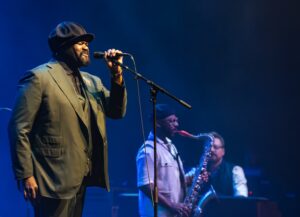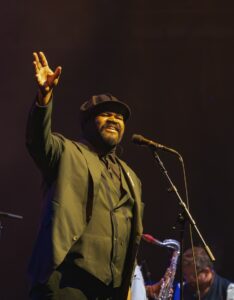Concert Hall, Sydney Opera House, October 20
8/10
Gregory Porter’s voice is like a log fire on a winter’s night. It doesn’t just radiate warmth, it has a comfort factor. It’s the voice of someone who’s worked out a thing or two about this very temporary exercise called life, and wants to ease the suffering and spread a little beneficence with a generosity of heart that’s the opposite of those people who win talent quests by impressing. Porter has bigger fish to fry than merely impressing.

A mere nine years ago he was at the old Basement. Now he’s packing out the Concert Hall with fans who know all the songs, having been seduced by the voice of this barrel-chested man in the trademark hat, who can fleetingly remind you of singers ranging from Nat King Cole to Marvin Gaye, yet sounds only like himself. He lets jazz flow into soul as naturally as two rivers meeting, so it’s impossible to define where they merge.
Most of the songs are his own, with lyrics about coping, loving, hoping and improving. The latter’s quite an attractive idea, given most of us seem to believe that bemoaning our lot is a form of conversation. You feel the truth of the magnanimity with Porter, not just via the lyrics and the amusing between-song chat, but via the voice itself, which seems to proclaim that goodness is possible, and you leave the two-hour show briefly believing it.

His long-term quartet has been augmented by organist Ondrej Pivec, who maximises the inherent drama of a Hammond B3, and provides another soloing voice to join tenor saxophonist Tivon Pennicott and pianist Chip Crawford. Bassist Jahmal Nichols anchors the music, while also providing the night’s most engrossing solo feature, which built into a groove so wicked it must be barely legal, and then morphed into two rare covers: The Temptations’ My Girl and Papa Was a Rolling Stone. Drummer Emanuel Harrold remains the joker in the pack: unusually busy for the soul side of the idiom (if not the jazz), and ensuring the music was energised and studded with surprises.
Porter’s anthemic Musical Genocide dropped away to just Crawford’s piano, which slipped into Waltzing Matilda. Although Porter didn’t sing it, the audience did, and what could easily have been corny was actually quite touching. More moving was Porter’s Water Under Bridges, ostensibly about a break-up; more pertinently about how his brother helped him cope: a brother who died during the pandemic. Sung with only piano accompaniment this allowed us to immerse ourselves in the voice’s richness. Seldom did he unleash its full magnificence, but when he did, as on the spiritual Wade in the Water, you were physically pushed back by its power.
The sound was second-rate to start, and never became quite as sharply focused as it can be in this room, although it did keep improving, right through to the second (genuinely demanded) encore.